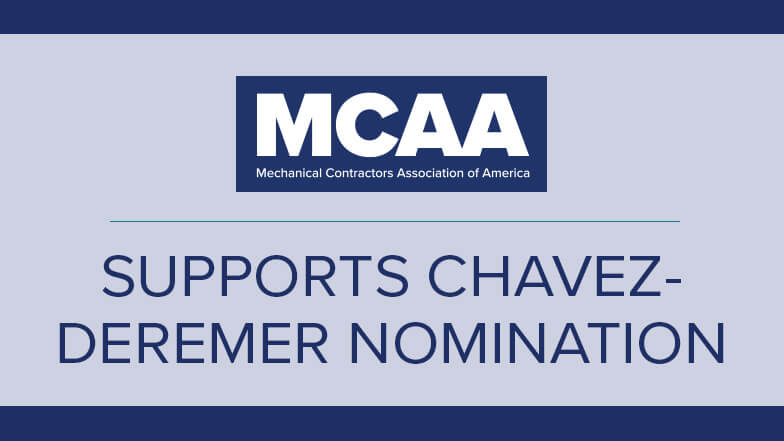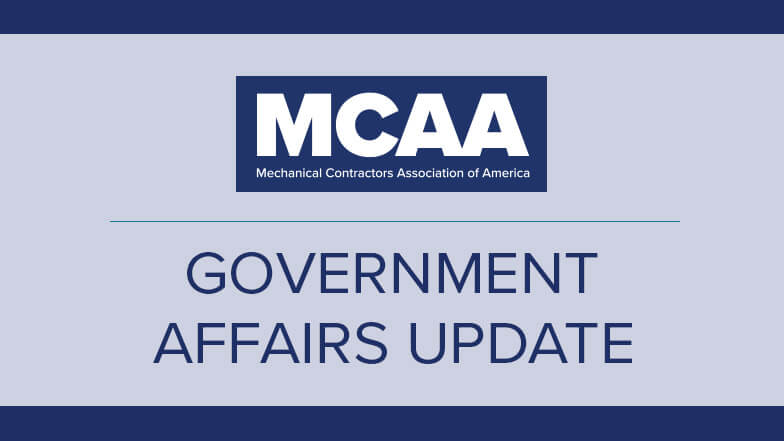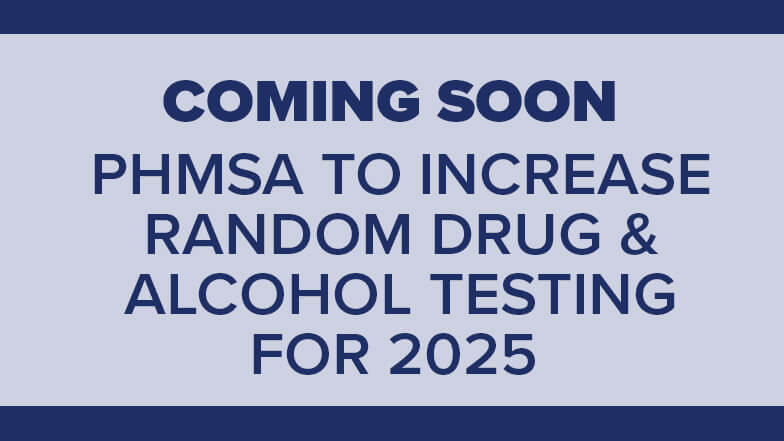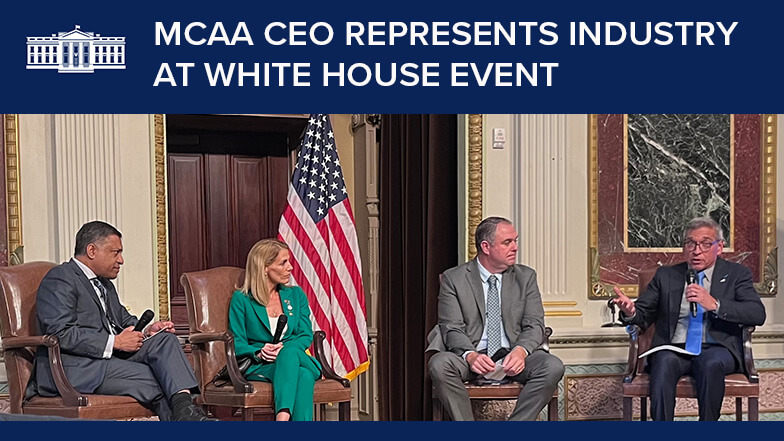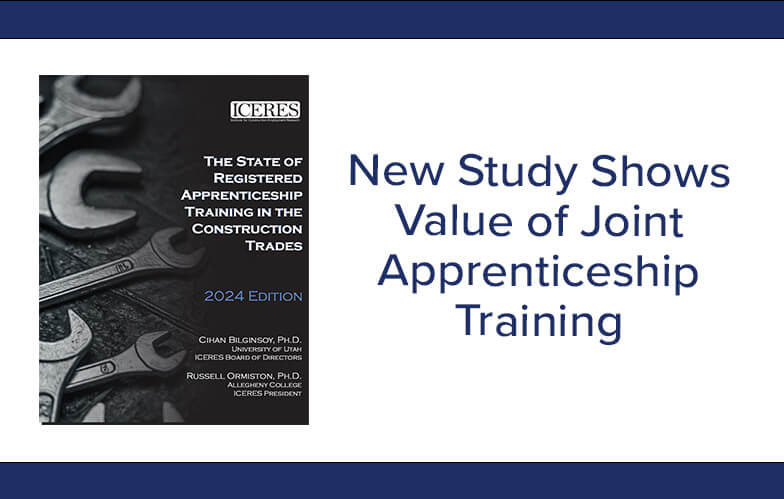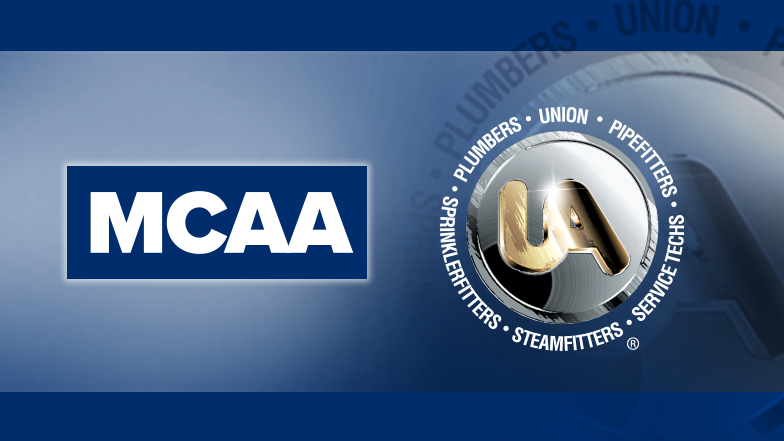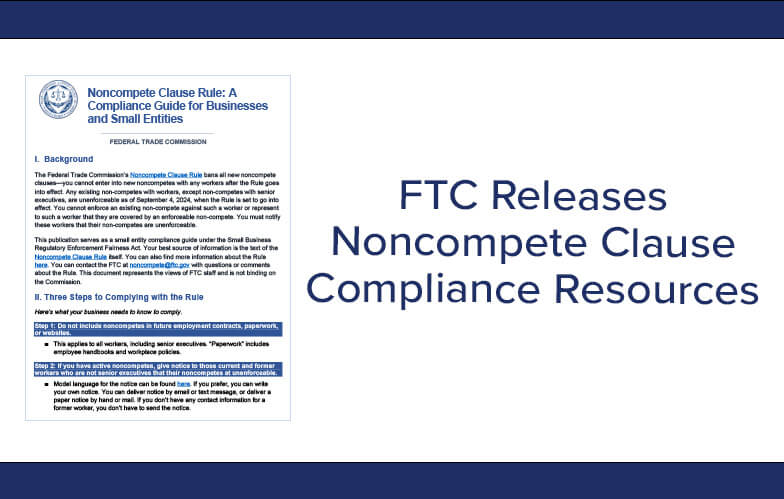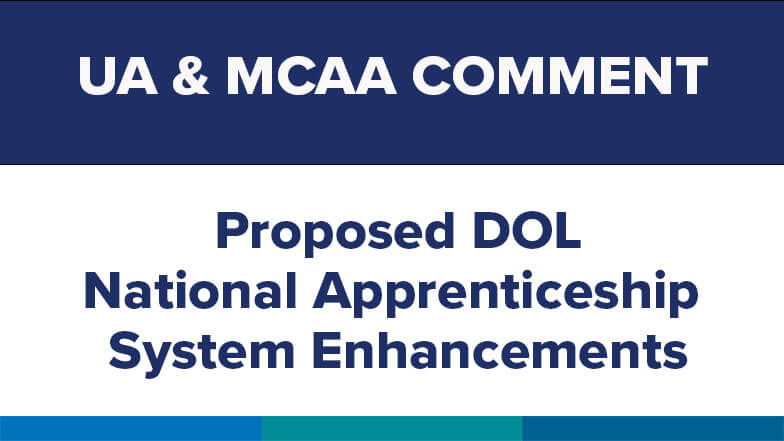Advocacy
Be the Difference We Make in DC
MCAA is working in Washington to advance our industry’s future. Take a moment to participate and support your Political Action Committee. Have your voice heard!
Leading on the Issues
Year after year, you can count on MCAA to take the lead on the issues that make a difference to you and your company. Here are just some of the issues we are working on in Congress to protect your livelihood and set the stage for a bright future. Working in concert with other like-minded associations and with our labor partners at the United Association of Plumbers and Pipefitters, MCAA staff is again on the Hill making your voice heard.
Our position:
MCAA continues to press for new multiemployer pension plan design options for pension trustees to consider - most notably the Composite Plan option, which combines the best features of Defined Benefit plans for plan participants, and the sustainability features of Defined Contribution plans for contributing employers. MCAA also supports technical corrections to the 2014 Kline-Miller Multiemployer Pension Reform Act to allow regulators to more readily approve benefits suspension applications for the 100 or so critical and declining plans, to preserve benefits for plan participants and forestall plan insolvency and mounting insurance claims on the Pension Benefit Guaranty Corporation (PBGC). MCAA also works to make sure any eventual PBGC insurance rate increases on multiemployer plans are kept to the minimal extent necessary, and are phased in gradually so as to limit incentive to exit PBGC-insured plans solely because of premium hikes. MCAA also would support low-interest Federal plan programs only to the extent necessary to forestall PBGC insolvency and exorbitant PBGC premium increase on the majority of well-funded construction industry plans.
Our position:
MCAA supports legislative proposals to increase Federal infrastructure investments, with a fair balance of vertical and building and utility service infrastructure, as well as highways, roads and bridges. Direct Federal appropriations are essential, but given budget constraints, Federal and state cost sharing and public/private partnerships may be essential to meet the government’s need to provide adequate public purpose projects and services. Still, with those alternate financing options MCAA will work to make sure that Federal prevailing wage and workforce development policies are maintained. Davis Bacon should be preserved, Federal contractor selection procedures and other contracting protections (contract provisions providing for equitable adjustments, differing site conditions, warranty provisions, performance and payment bonds) are preserved in those programs to the maximum extent possible. Similarly, MCAA works to preserve public agency options to consider use of project labor agreements on both direct Federal and federally assisted projects as well.
Our position:
MCAA works to make sure the basic structure of Federal prevailing wage standards is not undermined in separate Federal agency funding bills for traditional direct Federal projects. MCAA also opposes Labor Department administrative or funding changes that would undermine the Davis Bacon wage determination process, or oversight and administrative compliance enforcement by the Labor Department. MCAA aids contractors with specific Davis Bacon project administration issues.
Our position:
MCAA continues to work to preserve the proprietary discretion allowed to public procurement agencies to consider the beneficial of use of project labor agreements on direct Federal and federally assisted construction projects. MCAA opposes any legislative, regulatory or Executive Order dictate that would remove existing discretion in the Federal Acquisition Regulations permitting Contracting Officers, as a matter of sound acquisition planning and proprietary judgment, to assure adequate project workforce skills and availability to ensure successful project performance.
Our position:
MCAA continues to work for Federal legislative and regulatory reforms that would curb widespread worker misclassification abuses and clamp down on unfair and illegal competitive advantages for unscrupulous firms in the industry. MCAA defends against proposals that would promote lax worker classification procedures, and supports legislative proposals that would allow tax authorities to set misclassification standards on and industry-by-industry basis, believing that one-size-fits-all industry standards don’t promote unfair competition in the construction industry.
Our position:
MCAA works to monitor various regulatory initiatives that undermine the benefits of registered apprenticeship programs for MCAA member firms relative to other employers participating in non-regulated industry-certified programs. Moreover, MCAA is working to roll back much of the overregulation put forward by the last Administration’s non-discrimination and written affirmative regulations requirements for registered apprenticeship programs with 5 or more participants.
Our position:
MCAA opposes Federal executive agency procurement mandates requiring paid sick and family leave payments on direct Federal construction projects. MCAA is working to roll back Executive Order 13706's paid personal time off requirement on direct Federal projects. Moreover, MCAA helps local affiliates address the proliferation of such paid personal time off requirements in state and local jurisdictions across the country. MCAA supports state preemption of various local ordinances in any state, and similarly supports Federal preemption of the various state mandates. MCAA also works to gain exemptions in the various laws or regulations for construction employers with collective bargaining agreements covering project workforces. Similarly, MCAA seeks regulatory exemptions that acknowledge the unique project scheduling and subcontractor work sequencing demands of construction project employment.
Our position:
MCAA continues to work to repeal the often -delayed Cadillac tax on multiemployer health plans. MCAA continues to look for opportunities to level the playing field in any remaining employer mandate contained in the Affordable Care Act by lowering the employment threshold for the employment mandate in the construction industry to a level that is commensurate with our industry's small business size standards. Similarly, MCAA worked hard to expand tax credits and deductions for energy efficiency retrofits for commercial and industrial facilities, industrial waste heat recovery investments, and to maintain and expand tax credits and expensing for hvac equipment and fire sprinkler installation in commercial and residential facilities.
Our position:
MCAA opposes various forms of workforce overtime pay/flex-time proposals that would amend established Federal overtime pay requirements and thereby allow opportunities for abuse and avoidance of strict overtime pay requirements for workers.
What's New
The Mechanical Contractors Association of America (MCAA) applauds President-elect Trump for his nomination of Rep. Lori Chavez-DeRemer to be the next Secretary of Labor. Given the impact of the Labor Department on a wide range of critical issues, we urge the U.S. Senate to act quickly next year to confirm Chavez-DeRemer to this important leadership position.
As part of its ongoing commitment to protecting your livelihood and setting the stage for a bright future, MCAA has secured the services of Longbow Public Policy Group to advise our MCAA Government Affairs Committee (GAC). GAC Chair, Jim Gaffney will be passing along information relative to our industry on a regular basis.
Regardless of where one falls on the political spectrum, the fascinating 2024 presidential and congressional elections will continue to be studied by historians and political scientists a century from today. With the results now in, MCAA was excited to discuss this election with one of the nation’s premier thought leaders and political data experts, Karlyn Bowman. This webinar, recorded on Friday, November 22, 2024, was moderated by Jim Gaffney, Chair of MCAA’s Government Affairs Committee (GAC) and CEO of Goshen Mechanical in West Chester, Pa., alongside Chuck Daniel, MCAA’s Senior Advisor.
On Wednesday November 20, 2024, the Pipeline Hazardous Materials Safety Administration (PHMSA) published a notice explaining that for calendar year 2025 it is increasing from 25% to 50% the rate of random drug and alcohol testing for employees of operators and contractors engaged in operations, maintenance or emergency response for gas pipelines facilities, hazardous liquid pipeline facilities, carbon dioxide pipeline facilities, liquefied natural gas (LNG) plants, and underground natural gas storage facilities. In the notice, PHMSA also clarifies how operators and contractors should report their drug and alcohol testing data.
The U.S. Department of Labor’s (DOL) Wage and Hour Division (WHD) has announced a series of online seminars for unions, contractors, contracting agencies, workers and other stakeholders. The seminars will cover fiscal year 2025 prevailing wage requirements for federally funded construction and service contracts.
On Tuesday, October 8th, 2024, MCAA CEO Tim Brink joined the White House Domestic Policy Council (DPC) and White House Office of National Drug Control Policy (ONDCP) for the first White House Challenge to Save Lives from Overdose Event. The event celebrated nearly 250 commitments from stakeholders across all sectors to help expand access to lifesaving opioid overdose reversal medication and reduce preventable drug overdose deaths.
As part of its ongoing commitment to protecting your livelihood and setting the stage for a bright future, MCAA has secured the services of Longbow Public Policy Group to advise our MCAA Government Affairs Committee (GAC). GAC Chair, Jim Gaffney will be passing along information relative to our industry on a regular basis.
As part of its ongoing commitment to protecting your livelihood and setting the stage for a bright future, MCAA has secured the services of Longbow Public Policy Group to advise our MCAA Government Affairs Committee (GAC). GAC Chair, Jim Gaffney will be passing along information relative to our industry on a regular basis.
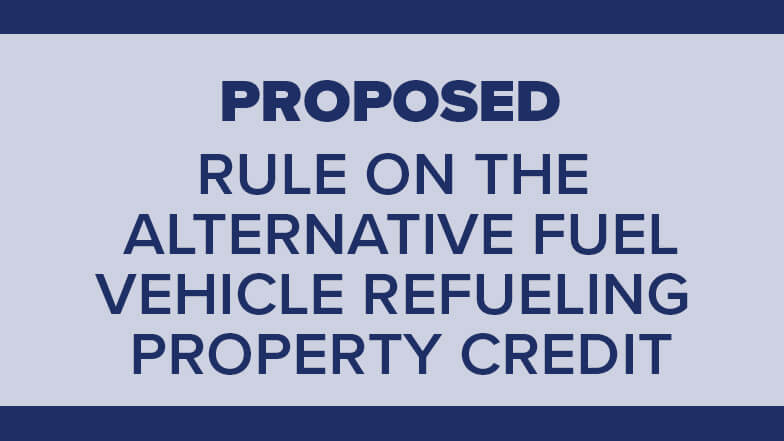
Yesterday, The Department of Treasury (Treasury) and The Internal Revenue Service (IRS) released pre-publication text of a proposed rule (NPRM) to provide guidance for the Alternative Fuel Vehicle Refueling Property Credit as amended by the Inflation Reduction Act for “qualified alternative fuel vehicle refueling property.” The NPRM will publish in today’s Federal Register, subject to a 60-day comment period.
As part of its ongoing commitment to protecting your livelihood and setting the stage for a bright future, MCAA has secured the services of Longbow Public Policy Group to advise our MCAA Government Affairs Committee (GAC). GAC Chair, Jim Gaffney will be passing along information relative to our industry on a regular basis.
New academic research documents the primacy of the construction industry labor/management joint apprenticeship training infrastructure in building and maintaining the high-skill workforce and employment standards in the construction industry for the benefit of the overall economy, journey workers and apprentices, construction employers, and their public and private sector clients.
Massachusetts Senator Elizabeth Warren and Massachusetts AFL-CIO President Chrissy Lynch published an August 6 op-ed in the Boston Globe. In it, they refute criticism of Project Labor Agreement use on federally-sponsored construction projects, citing some $20 billion in Biden Administration construction investments within the state over the past three years. Their argument relies heavily on the Independent Project Analysis (IPA) report, Quantifying the Value of Union Labor in Construction Projects, commissioned by MCAA and the UA, acting through the Mechanical Industry Advancement Fund, in December 2022.
As part of its ongoing commitment to protecting your livelihood and setting the stage for a bright future, MCAA has secured the services of Longbow Public Policy Group to advise our MCAA Government Affairs Committee (GAC). GAC Chair, Jim Gaffney will be passing along information relative to our industry on a regular basis.
As part of its ongoing commitment to protecting your livelihood and setting the stage for a bright future, MCAA has secured the services of Longbow Public Policy Group to advise our MCAA Government Affairs Committee (GAC). GAC Chair, Jim Gaffney will be passing along information relative to our industry on a regular basis.
As part of its ongoing commitment to protecting your livelihood and setting the stage for a bright future, MCAA has secured the services of Longbow Public Policy Group to advise our MCAA Government Affairs Committee (GAC). GAC Chair, Jim Gaffney will be passing along information relative to our industry on a regular basis.
The Treasury Department and the Internal Revenue Service (IRS) have published final regulations regarding the prevailing wage and registered apprenticeship (PWA) requirements that taxpayers must satisfy to receive five times the base tax credit or deduction amounts with respect to certain clean energy facilities, properties, projects, technologies, or equipment under the Internal Revenue Code (the Code), as amended by the Inflation Reduction Act of 2022 (IRA).
As part of its ongoing commitment to protecting your livelihood and setting the stage for a bright future, MCAA has secured the services of Longbow Public Policy Group to advise our MCAA Government Affairs Committee (GAC). GAC Chair, Jim Gaffney will be passing along information relative to our industry on a regular basis.
As part of its ongoing commitment to protecting your livelihood and setting the stage for a bright future, MCAA has secured the services of Longbow Public Policy Group to advise our MCAA Government Affairs Committee (GAC). GAC Chair, Jim Gaffney will be passing along information relative to our industry on a regular basis.
As part of its ongoing commitment to protecting your livelihood and setting the stage for a bright future, MCAA has secured the services of Longbow Public Policy Group to advise our MCAA Government Affairs Committee (GAC). GAC Chair, Jim Gaffney will be passing along information relative to our industry on a regular basis.
A Federal Trade Commission (FTC) rule banning non-compete clauses is set to go into effect on September 4, 2024. Under the rule, non-competes are broadly defined as any arrangement that prohibits, penalizes, or functionally prevents a worker from getting a new job or starting a business after leaving their employment, even if the agreements are not labelled as non-competes. In short, the rule bans employers from entering into non-competes with workers covered by the rule. It also imposes an obligation on businesses to notify former employees and contractors with whom they previously entered into non-competes, that these agreements are now unenforceable. There is an exception for agreements with senior executives related to the bona fide sale of a business and for situations where a dispute arose about whether the non-compete was breached before the effective date of this rule.
As part of its ongoing commitment to protecting your livelihood and setting the stage for a bright future, MCAA has secured the services of Longbow Public Policy Group to advise our MCAA Government Affairs Committee (GAC). GAC Chair, Jim Gaffney will be passing along information relative to our industry on a regular basis.
As part of its ongoing commitment to protecting your livelihood and setting the stage for a bright future, MCAA has secured the services of Longbow Public Policy Group to advise our MCAA Government Affairs Committee (GAC). GAC Chair, Jim Gaffney will be passing along information relative to our industry on a regular basis.
As part of its ongoing commitment to protecting your livelihood and setting the stage for a bright future, MCAA has secured the services of Longbow Public Policy Group to advise our MCAA Government Affairs Committee (GAC). GAC Chair, Jim Gaffney will be passing along information relative to our industry on a regular basis.
The UA and MCAA recently submitted comments on the U.S. Department of Labor’s (DOL) proposed enhancements to the national apprenticeship system. The UA and MCAA strongly support provisions in the rule which will bolster successful registered apprenticeship programs and the safety and welfare of apprentices.
As part of its ongoing commitment to protecting your livelihood and setting the stage for a bright future, MCAA has secured the services of Longbow Public Policy Group to advise our MCAA Government Affairs Committee (GAC). GAC Chair, Jim Gaffney will be passing along information relative to our industry on a regular basis.
